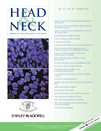Mastoid recurrence after radiotherapy for nasopharyngeal carcinoma: Two case studies
Abstract
Background.
The mastoid is a rare site of nasopharyngeal carcinoma recurrence after radiotherapy, and no relevant reports are currently in the literature.
Methods.
Two case reports are presented describing patients with a history of nasopharyngeal carcinoma who received primary radical radiotherapy. The first was treated by conventional radiotherapy, using 2-dimensional techniques, while the second was delivered by intensity-modulated radiation therapy (IMRT).
Results.
The patients presented with progressive mastoid recurrence after radiotherapy at 12 and 16 months, respectively. Clinical presentation of mastoid recurrence was similar to mastoiditis. Meanwhile, distant metastasis occurred in both cases. To date, 1 has died of distant metastasis, and the other is alive with disease stabilization following chemotherapy treatment.
Conclusion.
This is the first report of mastoid recurrence after radiotherapy for nasopharyngeal carcinoma, which should alert clinicians to probe into the pathogenesis and pay attention to the relationship between mastoid recurrence and distant metastasis. © 2010 Wiley Periodicals, Inc. Head Neck, 2010




